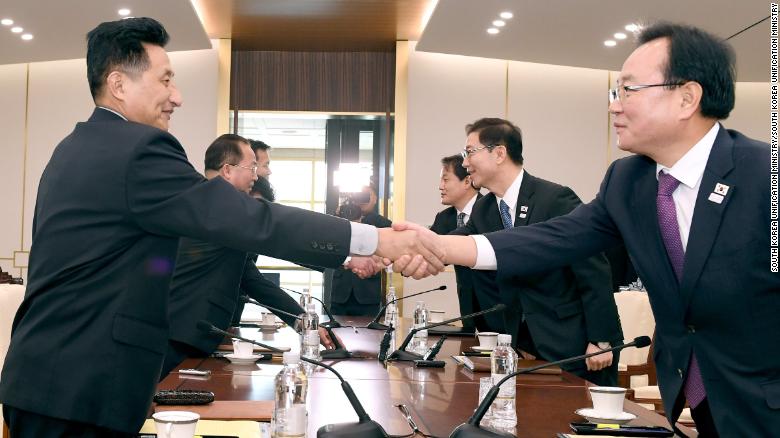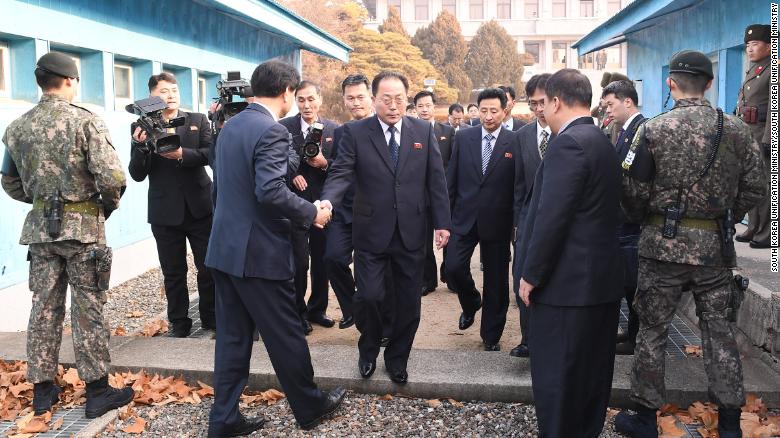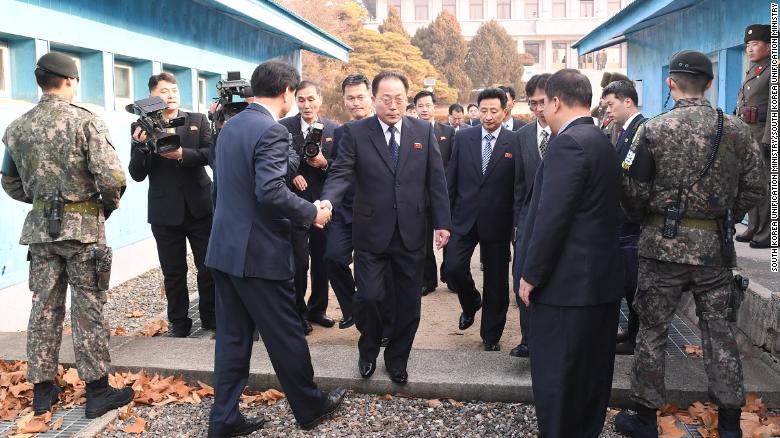US, Japan warn North Korea playing for time as talks press on
(CNN)South Korea pressed ahead with talks to include its northern neighbor in next month's Winter Olympics Wednesday, but Seoul's allies are voicing concern Pyongyang may be using the talks to buy time to pursue its weapons program.
The US military has moved more firepower to the region and its top diplomat, Secretary of State Rex Tillerson, warned of complacency, while his Japanese counterpart called on the international community to be clear-eyed about North Korea's motivations for participating in the talks, which have been hailed by some as the most significant thaw in ties in years.
"I believe that North Korea wants to buy some time to continue their nuclear and missile programs," Japanese Foreign Minister Taro Kono said at a meeting with his US, South Korean, British and Canadian counterparts in Vancouver, where the five are discussing how to handle the North Korea crisis.
"It's not the time to ease pressure towards North Korea," he said.
Officials from both sides of the Korean Peninsula are meeting for a third round of talks at the demilitarized zone that divides North and South Korea, likely to finalize proposals regarding how exactly Pyongyang will participate in the Winter Games next month at Pyeongchang ahead of a meeting with the International Olympic Committee on Friday.
North Korea is planning to send a 140-person orchestra to the Games along with a high-level delegation that will include athletes, a cheering squad, an art troupe, a visitors' group, a taekwondo demonstration team and a press corps.
Two North Korean skaters have qualified for the Games (though it's unclear if they'll be allowed to compete) and the two sides have discussed fielding a joint women's ice hockey team.

North and South Korean delegates meet at the DMZ to discuss the logistics of North Korea's participation in the 2018 Pyongchang Olympic games.
No concessions
Observers initially praised the benefits that come with face-to-face talks, however, there now appears to be a growing concern among Seoul's allies and partners that North Korea might be playing them for time.
Opponents of South Korean President Moon Jae-in's current willingness to bring North Koreans to the Games worry that Seoul is giving the North Koreans a chance to show off their best and brightest on a world stage without making any concessions or even discussing the issue that concerns the international community the most: its nuclear weapons program.
Tillerson said at the Vancouver summit he said the current campaign to pressure the Kim Jong Un regime into giving up its nuclear aspirations would continue "until North Korea takes decisive steps to denuclearize."
"This is a strategy that has and will require patience, but, thanks to your support, the regime is already facing costs it is having difficulty bearing," he said.
In Vancouver, South Korea's Foreign Minister Kang Kyung-wha said the talks were a "significant step" but acknowledged the serious challenges ahead: "Despite these overtures to improve relations with the South, North Korea has yet to show any intention to fulfill its international obligations regarding denuclearization."

North and South Korean delegates are meeting for the third time in several days.
'Spasm of a lunatic'
Some hope that the inter-Korean meetings that began last week -- the first of their kind in more than two years -- while starting with less contentious issue like sport, would provide a forum or help cultivate personal relationships that could lead to broader negotiations in the future.
Washington and Seoul opted to postpone their annual military exercises until after the Olympics as a gesture of good faith.
However, North Korea has remained adamant throughout this year's thaw in relations with South Korea that its nuclear bombs and ballistic missiles are here to stay.
Even a mention of North Korea's nuclear weapons program by South Korean negotiators drew the ire of North Korean officials when the landmark talks kicked off last week, the South Korean Unification Ministry said.
"This fact that South Korea is trying so hard to achieve our participation of the Winter Games clearly reveals their wicked intent of leading us into giving up nuclear weapons," North Korean state media said in a piece published Sunday.
North Korea also hasn't let up on its anti-US rhetoric. On Tuesday, state news agency KCNA mocked US President Donald Trump, referencing a recent tweet as the "spasm of a lunatic."
While welcoming talks and suspending military drills, the United States announced it has deployed six nuclear-capable B-52 Stratofortress bombers to Guam, a move likely to stoke fear and anger among North Korea's military leaders.
The US Air Force said the deployment is part of the US military's effort to maintain a "continuous bomber presence" in the Pacific, but the B-52s are replacing B-1 Lancers, bombers that are not designed to carry nuclear weapons.
News Courtesy: www.cnn.com











